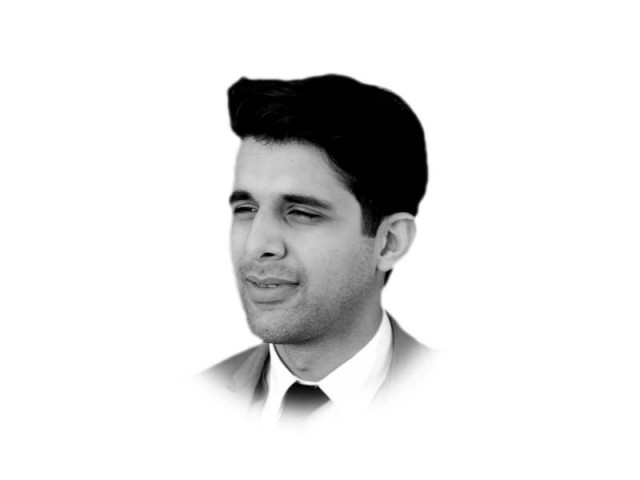Pakistan’s need for volatility
Stock market crashed because there was volatility

The writer is a lawyer from Karachi and tweets @shahzaibkhan901
The previously best performing stock exchange in Asia has fallen almost 28 per cent, wiping off billions of dollars in value, since hitting its peak only seven months ago, to become the worst performing market in Asia this year.
The question is why? The answer is volatility. The question then is, why, the volatility? The volatility exists because Pakistani investors think the federal government is too weak to survive and will cease to exist at any second, clearing the way for anarchy and near-apocalyptic destruction, at least of the stocks they’re holding. Hence, they sell. Why do these investors think so?
“The government is about to go.” On a list of things Pakistanis say, this is right up there with “the match is fixed” and “Pakistan is at an important crossroads in its history.” Pakistani drawing rooms, tea shops, public and private offices alike, and perhaps most importantly the nation’s television screens are occupied 24/7 with talk of the government ‘going’. The government has been ‘going’ since May 2013, basically since the day it was sworn in. And while the cabinet and the PM may have changed, by ‘the government going’ Pakistanis really only mean one thing, the dreaded, and, equally welcomed, coup, or a takeover by the military. So, is the military taking over?
No.
That should calm their nerves, the stockholders, the drawing room analysts, the rickshaw drivers who will use the ‘government is going’ as a topic for small talk to get you to tip better. But it doesn’t. Knowing, that the military is not likely to take over, that the federal government is likely to survive till the next election cycle, that Pakistani democracy may just drag its battered body over the finish line, it doesn’t calm the nerves of Pakistanis. In fact, it makes us uncomfortable.

That doesn’t make any sense. Does it?
Pakistanis have a quirky knack for, what is best termed, self-deprecating volatility. It’s this recurring need for the upheaval of systems. The upheaval of democracy by dictatorships, and vice versa. It’s like the ‘grass is always greener’ metaphor, only that in this case the metaphor is, personified by a nation of 280 million people, resulting in billions of dollars being lost, and often quite bloody. Addicted to the adrenaline rush of instability that has characterised its short history, the nation is now dependent on a steady stream of revolutions, and counter-revolutions, and coups, of all three kinds, military, democratic and Pakistan’s local favourite, the hybrid technocrat coup.
Consider the last 17 years of federal government in Pakistan. As the new millennium dawned, most Pakistanis welcomed the ouster of a troubled Nawaz regime by the military dictator, Pervez Musharraf. To those who say, the military coup was not welcomed, but opposed, the deafening silence of a nation of hundreds of millions on the night of 12th October 1999 shall prove otherwise. The Musharraf regime, then, initially accepted and welcomed, quickly fell prey to Pakistan’s cyclical system of counter-revolutions, this time in the form of the lawyer’s movement in 2007. Musharraf is out, the People Party forms the government in 2008 and in the next five years Pakistan experiences two long marches to the capital which render the federal government ineffective. Enter the PML-N, which wins the elections in 2013 and takes the baton from a PPP that is more than willing to pass it on. During Musharraf’s government, they were called ‘movements’, under the PPP they were called ‘long marches’, and as the PML-N takes the helm, Pakistan’s unquenchable need for upheaval takes the form of two massive dharnas (sit-ins) by opposition leader Imran Khan. And it’s not just the last 17 years, not even the last few decades. Pakistan’s history is consistently rigged with instances of massive upheavals and discontinuation of political establishments, whether democratic or not, on the back of mass appeal. Now I’m not saying these movements were uncalled for; of course, each of them were distinct in character and perhaps the need of the hour, considering most were noble causes. The point here is not that. The point is the people’s willingness to be part of it, every single time. The point is that once you experience such volatility, whether for right or wrong, you ultimately come to anticipate it. Even when it may not be there.
The Chief of the Army Staff (COAS) is the usual suspect when it comes to threats to the ‘democratic order’ in Pakistan, considering the variety of coups in the country’s history. The current COAS is, however, going to significant lengths to assure his countrymen, that the current democratic government faces no threat of takeover from him or his institution. Symbolising this position of the chief is his recent appearance before the Senate committee of the whole, and his candid assurance that the military wants the preservation of the democratic system. This is uncharacteristic of an army chief. His claim is uncharacteristic too. It was uncanny when as the chief made these remarks, political analysts sensed a veiled threat to democracy, in the chief’s insistence that there was no threat to democracy.
So the stock market has crashed. Expectedly so. It crashed because there was volatility. There was volatility because Pakistan constantly anticipates volatility, even when it’s not reasonable to do so. This habitual anticipation of volatility creates actual volatility and the stock market crashes, even though nothing much has really happened. It’s like Chinese whispers, you get the picture.
.Published in The Express Tribune, December 30th, 2017.
Like Opinion & Editorial on Facebook, follow @ETOpEd on Twitter to receive all updates on all our daily pieces.















COMMENTS
Comments are moderated and generally will be posted if they are on-topic and not abusive.
For more information, please see our Comments FAQ